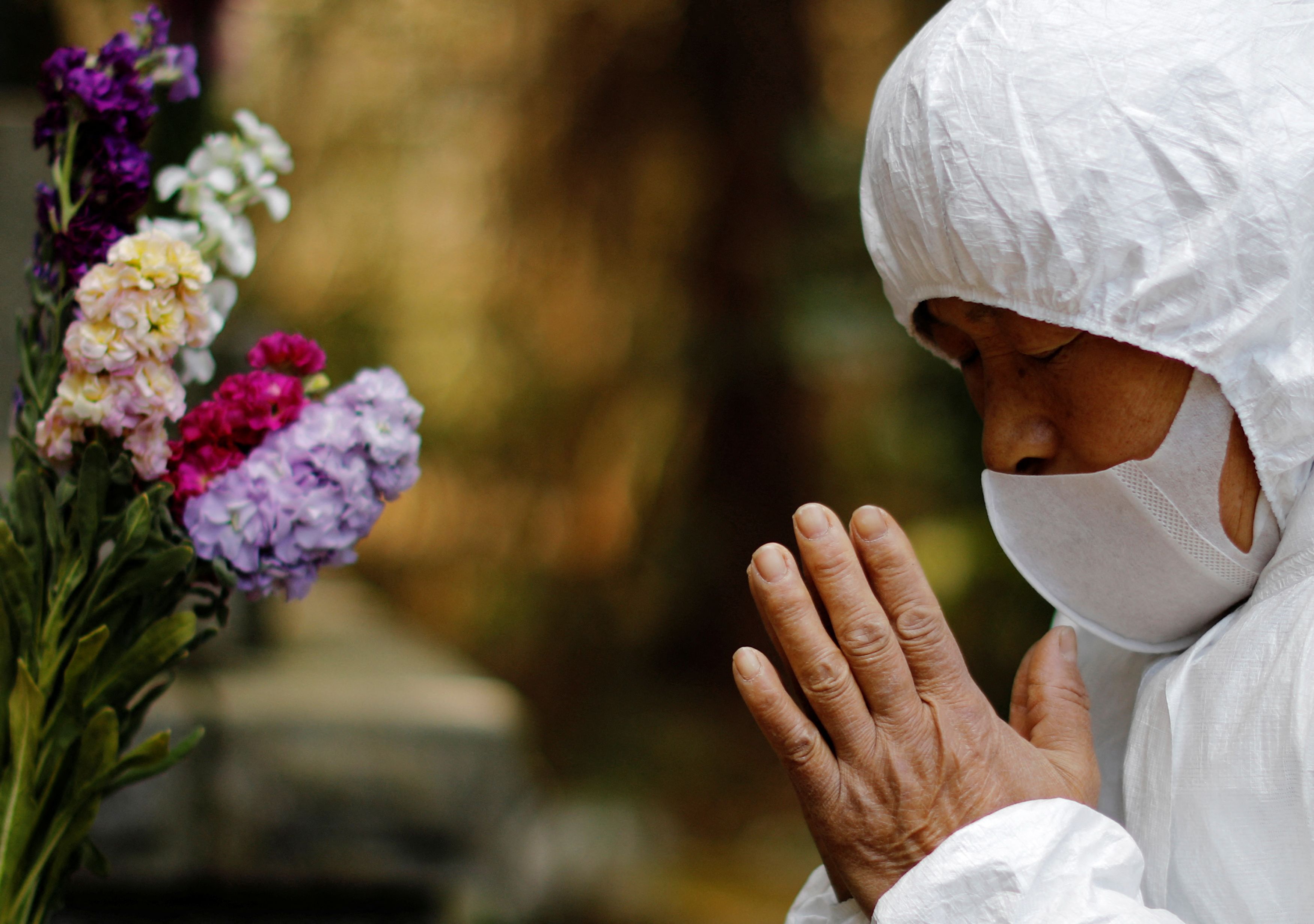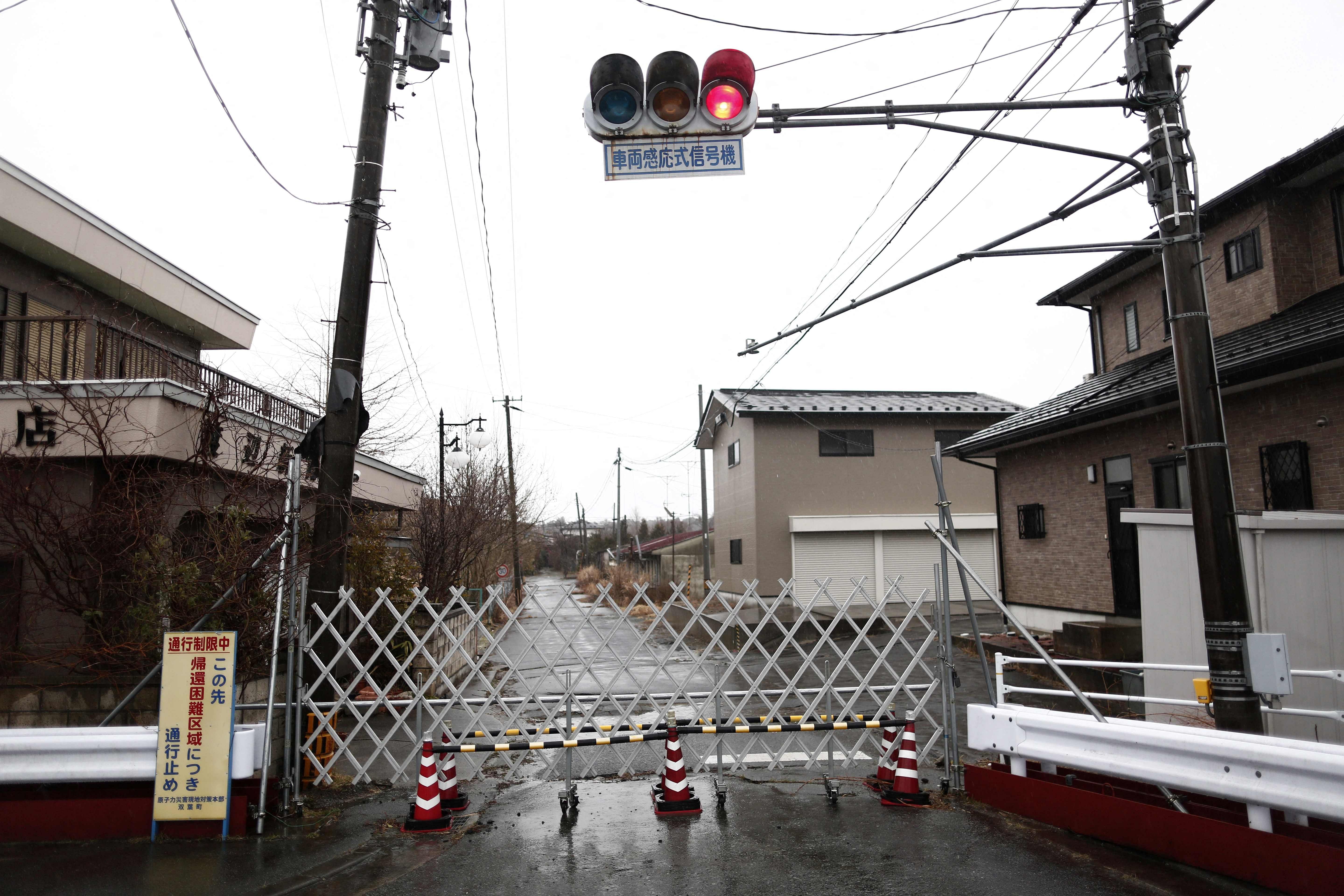Japan says it needs nuclear power. Can host towns ever trust it again?
Sign up now: Get insights on Asia's fast-moving developments

A Japanese woman wears a protective suit as she prays at her family's graveyard, 2.5km away from Japan's crippled Fukushima nuclear power plant, in February 2021.
PHOTO: REUTERS
KASHIWAZAKI, JAPAN (NYTIMES) - Growing up, Ms Mika Kasahara saw the nuclear power plant that hugs the coast of her hometown simply as the place where her father worked, a familiar fortress of cooling tanks and steel lightning towers overlooking the Sea of Japan.
"We thought that as long as nothing bad happened, it's fine," Ms Kasahara, 45, said.
After the disaster 11 years ago at a nuclear power station in Fukushima, where an earthquake and tsunami led to a triple meltdown, Japan took most of its nuclear plants offline.
Now, Ms Kasahara, spooked by security breaches and damaged infrastructure at the power station near her home, wants it shuttered for good.
Ms Kasahara symbolizes the long road Japan faces as Prime Minister Fumio Kishida, confronting threats to fuel supplies posed by the Ukraine war and vowing urgent action to reduce carbon emissions, intensifies efforts to reboot the country's nuclear power network.
For the first time since the Fukushima catastrophe, a small majority of the Japanese public has expressed support for bringing the plants back online, indicating a growing awareness that the world's third-largest economy may struggle to keep the lights on as it confronts its own limited resources during a time of geopolitical upheaval.
But the decision to restart the plants is fraught with emotions and political calculation, not to mention the gargantuan technical task of fortifying the stations against future disasters in an earthquake-prone nation.
In Kashiwazaki, a midsize suburban city, and neighboring Kariwa, a small village, which together host the seven-reactor plant - the world's largest - in Niigata prefecture in northwestern Japan, the fate of the nation's idled power plants is deeply personal.
When Ms Kasahara's father died of esophagus and lung cancer three years ago, she wondered if his two decades inside the plant had been a factor. A traffic jam during an evacuation drill left her fearing that she and her family would be trapped by a nuclear accident.
"I was honestly very afraid," she said.
Public polling presents a muddier picture.
According to a 2020 survey by the city of Kashiwazaki, close to 20% of residents want to decommission the plant immediately.
About 40 per cent would accept the temporary operation of some reactors, but ultimately want the plant shut down.
Just over half of prefectural residents oppose a nuclear restart, according to a 2021 survey by Niigata Nippo, a local newspaper.

A South Korean environmental activist in Seoul wears a mask featuring Japan's Prime Minister Fumio Kishida (right), during a protest against a plan by Japan to discharge Fukushima radioactive water into the sea, in January 2022.
PHOTO: AFP
The public wariness will be tested in an election for governor this month in Niigata prefecture.
The current governor, Hideyo Hanazumi, 63, is backed by the governing Liberal Democrats but has remained vague about his restart intentions.
His challenger, Naomi Katagiri, a 72-year-old architect, promises to block the resumption of operations in Kashiwazaki and Kariwa.
The stakes are high because an unwritten government policy requires local political leaders to ratify nuclear reboots. Kariwa's mayor, Hiroo Shinada, 65, is a vociferous proponent, while the mayor of Kashiwazaki, Masahiro Sakurai, 60, is investing in wind power but would support the temporary operation of some reactors.
"Japan is not like Communist China that can impose a project" on communities, said Prof Daisaku Yamamoto, an associate professor of Asian studies at Colgate University and a native of Kashiwazaki.
While the national government influences local decisions, host communities "are not powerless either," he said.

A 2018 photo in Futaba, Japan, shows a closed gate to prevent people from entering the Fukushima exclusion zone.
PHOTO: AFP
Local opposition is not the only obstacle to restarting nuclear power stations.
All plants must adhere to strict new guidelines adopted by Japan's nuclear regulator two years after the Fukushima disaster.
Operators are required to erect higher sea walls, build backup cooling pools and install filtered vents that would reduce radioactive discharges.
Out of 60 reactors in Japan, 24 have been decommissioned and five are currently operating.
Another five have been approved to restart but are suspended for routine checkups, and three are under construction.
The rest have not been approved to restart.
Nuclear power now contributes less than 4 per cent of the nation's electricity, down from nearly a third before the Fukushima disaster. Japan currently draws more than three-quarters of its electricity from fossil fuels, and about 18 per cent from renewable sources.
Since 2014, the Liberal Democrats have said nuclear plants should generate more than 20 per cent of Japan's electricity by 2030. The war in Ukraine and the threat of a blackout in Tokyo after a strong earthquake this spring have made the public more receptive to this message. In a March poll by the Nikkei business newspaper, 53 per cent supported a restart of the plants.


